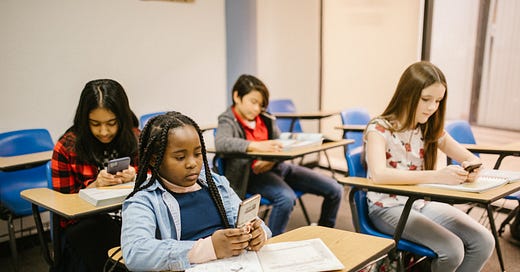Essential Excerpts: The Dumbing Effects of Smartphone Proximity
This Study Shows Why It's Crazy to Allow Smartphones in the Classroom
Hello Bar-setters! Earlier this week I referenced an amazing article from Dr. Jonathan Haidt: The Case For Phone-Free Schools.
Below is a short excerpt that should be on the radar of every parent and educator.
The Further You are From Your Phone, The Better Your Thinking
“Many studies show that students who use their phones during class learn less and get lower grades.
You might be thinking that these are correlational findings; maybe the smarter students are just better able to resist temptation? Perhaps, but experiments using random assignment likewise show that using or just seeing a phone or receiving an alert causes students to underperform.
For example, consider this study, aptly titled “Brain Drain: The Mere Presence of One’s Own Smartphone Reduces Available Cognitive Capacity.” The students involved in the study came into a lab and took tests that are commonly used to measure memory capacity and intelligence. They were randomly assigned to one of three groups, given the following instructions: (1) Put your phone on your desk, (2) leave it in your pocket or bag, or (3) leave it out in another room. None of these conditions involve active phone use—just the potential distraction of knowing your phone is there, with texts and social-media posts waiting. The results were clear: The closer the phone was to students’ awareness, the worse they performed on the tests. Even just having a phone in one’s pocket sapped students’ abilities.
The problem is not just transient distraction, though any distraction in the classroom will impede learning. Heavy phone or social-media use may also have a cumulative, enduring, and deleterious effect on adolescents’ abilities to focus and apply themselves. Nearly half of American teens say that they are online “almost constantly,” and such continuous administration of small pleasures can produce sustained changes in the brain’s reward system, including a reduction of dopamine receptors. This shifts users’ general mood toward irritability and anxiety when separated from their phones, and it reduces their ability to focus. That may be one reason why heavy phone users have lower GPAs. As the neuroscientists Jaan Aru and Dmitri Rozgonjuk put it in a recent review of the literature: “Smartphone use can be disruptively habitual, with the main detrimental consequence being an inability to exert prolonged mental effort.”
But smartphones don’t just pull students away from schoolwork; they pull them away from one another, too.”
Source: The Case for Phone-Free Schools, Jonathan Haidt
To learn more about focus and the the skills that are most important for students to learn, I recommend Deep Work, by Cal Newport.
In Case You Missed It…
Why We Need to Ban Smartphones From School
I recently spoke at my local school board meeting in favor of a policy to ban smartphones and smartwatches from the classroom. Here is my statement.
The 13 Most Important Questions For Every School Board Candidate
Much of the public conversation about schools is a distraction. These questions will illuminate the most pressing concerns in public education today.






